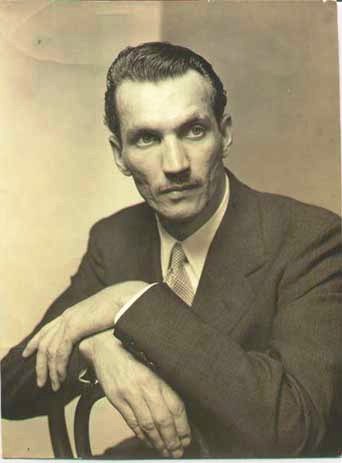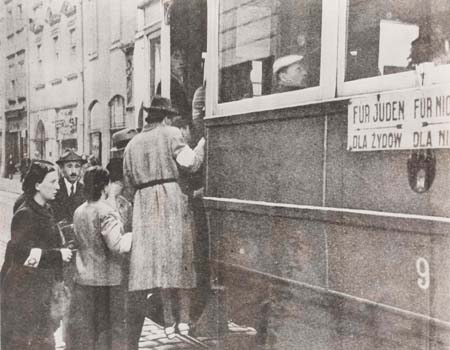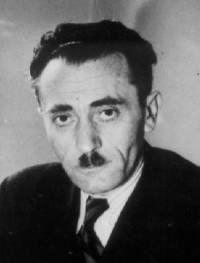Holocaust Education & Archive Research Team |
|
Survivor Stories
Holocaust Survivors Chelmno Survivors Righteous Gentiles Holocaust Recalled
| |||
Jan Karski Righteous Among Nations
Jan Karski was the non de plume of Jan Kozielewski, the youngest of eight children, born in a tenement house at 71 Kilinskiego Street on the 24 April 1914.
Following secondary school he went to Lvov in 1931 to study there. He was awarded with a Doctor of Law and Diplomacy title, and he later worked in the diplomatic corps, in pre-war Poland and secured coveted oversees postings in London and Paris.
Just prior to the Nazi invasion of Poland Jan Kozielewski enlisted in the army and served as a cavalry officer, when first the Germans then the Soviets invaded Poland in September 1939. He was captured by the Soviet forces and incarcerated in a detention camp. Jan Kozielewski escaped from the camp and joined the Polish underground, whilst most of his fellow captives were later executed by the Soviets.
Now Jan Karski, he became a skilled courier for the underground, working with the Allied forces in the West. Whilst employed on underground work he was arrested by the Gestapo in Preshov Slovakia in 1940, and he was brutally tortured.
Fearing that he might reveal secrets and betray his underground colleagues, he slashed his own wrists, and was put into a hospital, from where he was able to escape, with the help of the Underground.
In the third week of August 1942, in the midst of the Nazi mass deportation of the Jews of Warsaw to the Treblinka death camp, Jan Karski entered the Warsaw Ghetto, and met two Jewish leaders, Leon Feiner and Adolf Berman, this visit is reproduced in full- see Jan Karski inside the Warsaw Ghetto.
They both urged Jan Karski to inform the Allied leaders about the mass extermination of Polish Jewry. They both urged Karski to take to the Allies the following proposal:
Jan Karski knew that the proposals were bitter and unrealistic and beyond international law , and told them so, but sought advice from the two Jewish Bund leaders as to what he should say to Jewish leaders who lived abroad.
Leon Feiner invited Karski to go on another fact finding mission to witness at first hand how the Nazis were rounding up Jews for extermination. A few days after this meeting Karski and a member of the Jewish underground left Warsaw for Izbica.
Izbica was a transit ghetto where some Jews from the town itself, plus the adjacent communities as well as Jews from Germany, Austria and Czechoslovakia were sent, prior to their final journey to the Belzec and Sobibor death camps.
The account of Karski’s visit to Izbica, where he saw with his own eyes, the terrible conditions the Jews experienced, is reproduced separately – see Jan Karski – Visit to Izbica.
Returning to Warsaw, Jan Karski was given a microfilm of hundreds of documents and he made his way by train to Berlin, onto Vichy France, then crossed into Spain, reaching London, via Gibraltar.
In February 1943 Jan Karski met with the British Foreign Secretary Anthony Eden, later he recalled what Anthony Eden said, “That Great Britain had already done enough by accepting 100,000 refugees.”
In London he also met with Szmuel Zygelboym who represented the Jewish Socialist Bund in the National Council of the Polish government in exile, to inform him of what he had witnessed and to inform him of the desperate need for urgent action and what the Jewish leaders in the Warsaw ghetto had told him.
Szmuel Zygelboym said he would do all he could to help them but a few months later on the 12 May 1943, just after the Germans crushed the Jewish resistance in the Warsaw ghetto, he committed suicide.
In July 1943 Jan Karski travelled to the United States of America, where he met President Roosevelt. Whilst Jan Karski felt he failed to convince Roosevelt of the plight of the Jews, but it was not so, Roosevelt changed American policy by establishing the War Refugee Board, to help settle surviving Jews in America.
Jan Karski wanted to return to Poland to continue his work for the underground but he was ordered to remain in the USA, as the Germans now knew his identity. During his time in America he gave interviews and wrote articles, he wrote a book “Story of a Secret State,” which was published at the end of 1944.
Following the defeat of Nazi Germany Jan Karski decided not to return to Poland as it was now under the heel of the Soviets, and he abhorred Communism.
At the age of 39 he enrolled at the School of Foreign Services at Georgetown and he committed himself to a life of education, teaching at Georgetown until his retirement in 1984.
In 1965 he married Pola Nirenska, a dancer and choreographer, who had been born in Poland with the name Pola Nirensztain. She was the daughter of an observant Jewish father, all her relatives perished in the holocaust, but she was in London and survived the war.
She moved to America and became a celebrated force in Washington, teaching, choreographing her own work and leading her own company. Her last dance piece presented in Washington in 1990 was inspired by Holocaust victims she had known and was called “In Memory of Those I Loved…. Who Are No More”
In 1992 she committed suicide, by jumping from their apartment’s balcony and Jan Karski died on the 15 July 2000, aged 86, from heart and kidney ailments at Georgetown University Hospital.
Source:
New York Times Holocaust Historical Society MATERIAL TOWARDS A DOCUMENTARY HISTORY OF THE FALL OF EASTERN EUROPE JAN KARSKI
Copyright. Hans Zimmerman H.E.A.R.T 2008
|



,%20underground%20courier%20for%20the%20Polish%20government-in-exile%20who%20informed%20the%20west%20in%20the%20fall%20of%201942%20about%20Nazi%20atrocities%20against%20Jews%20taking%20place%20in%20Poland.jpg)
